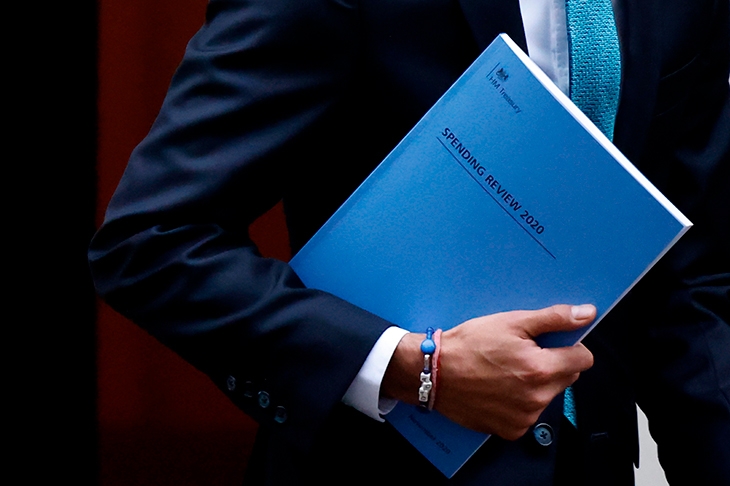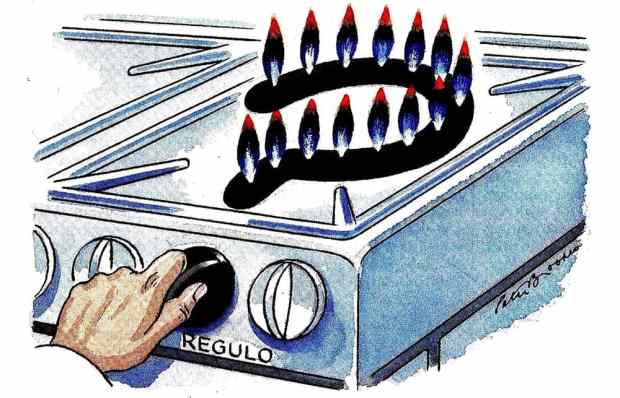Every country was blindsided by the pandemic; few governments responded to it by borrowing as much as Britain. The figures that Rishi Sunak laid out in his spending review this week boggle the mind. He has been Chancellor barely ten months, yet has already borrowed more than Gordon Brown did in ten years. The upshot of his Commons statement this week is that Sunak will carry on spending money as fast as the Bank of England can print it. But as he knows, debt bubbles have a habit of bursting. The response to this crisis may sow the seeds of the next one.
It’s a point which Sunak has a hard time making in Downing Street, let alone with his party. The Prime Minister likes to use the language of low taxes, economic dynamism and fast recoveries. But set against that is his instinct to answer every problem by spending. He has a worrying habit of indulging in comfort purchases: the HS2 line at £80 billion, or paying £500 million for a new 5G satellite network that even the private sector could not make financially viable. At least the military has been a beneficiary of the largesse. But the bills are mounting.
The fusion of No. 10 and the Treasury — a move that led to the resignation of Sajid Javid — has changed the role of the Chancellor. Once, the occupant of No. 11 set spending limits. Now Sunak jokes his role is to cash the cheques Boris Johnson likes to write (‘I should take his credit card away,’ he said last week.) The Bank of England’s printing presses have created £450 billion so far, with more on the way. We know what to expect next: an asset surge to benefit the richest, or inflation to punish savers; perhaps a new credit crunch. All grist to the Labour party’s mill.
Keir Starmer has kept a relatively low profile since his election as Labour leader earlier this year. His priority, so far, has not been to raise his national profile but to stabilise his party — and learn the lessons from last year’s crushing general election defeat. When he kicked Jeremy Corbyn out of the Labour party, it took just 17 days for its National Executive Committee to re-admit him. Starmer has no control over this process, but he has held firm and refused to restore the whip — so Corbyn is an MP, but not a Labour MP. Two dozen Labour MPs wrote a letter of protest, but Starmer did not buckle. What started as a dispute over anti-Semitism may soon become a battle between Labour’s left and its centre. That is a battle that Starmer looks likely to win.
The great Tory weapon against Labour — deployed in the every election campaign — is that the left always runs out of other people’s money. But it will be harder for the Conservatives to take the fiscal high ground from now on. Once the crisis is over and the inevitable inquiry begins, more people are going to start asking why £12 billion has been spent on a test and trace system which Sage says is making a ‘marginal’ difference to infection rates. The extent of fraud in the furlough scheme will become clearer — especially when, as seems inevitable when it finally ends in March, businesses go bust and unemployment surges.
In an internal investigation into Labour’s 2015 election defeat, Jon Cruddas, MP for Dagenham and Rainham concluded that Ed Miliband had lost not in spite of Tory austerity but because of it — many voters whom Labour might have hoped to win over had been positively attracted by a government which promised to live within its means. Throw away that advantage, and what will Boris Johnson be able to offer the country in 2024 which Keir Starmer cannot?
Next time around, Johnson won’t be able to benefit from an unelectable leader of the opposition. Starmer has not enlivened the opinion polls so far, but he has certainly set himself on a path to reverse last December’s historic defeat.
And if you can judge a man by the quality of his enemies, it speaks well of Starmer. The walkout of 13 Corbyn supporters from a virtual meeting of Labour’s National Executive Committee may have lacked the drama of Eric Heffer’s stomping departure from Neil Kinnock’s conference speech in 1985, but it places the current leader of the party exactly where he needs to be: on the side of the many voters, both on the left and in the centre, who never considered Corbyn fit to be prime minister.
Suddenly, Labour seems a serious prospect for government. There is plenty to do. On page 24, Paul Embery explains how Labour lost its own tribe — not just in the ‘Red Wall’ of the Midlands and the north but in London’s working-class suburbs. Winning the centre ground is not going to be enough to win elections if you can’t cling on to your core vote. But if the Johnson years mean tax rises to pay for unprecedented spending, Labour stands a far better chance of winning back voters lost to the Tories.
Johnson needs to do something impressive for Red Wall seats, and to retain the voters who took him to No. 10. But if he ruins the public finances — leaving him unable to cut taxes and stoke the recovery he needs — then he will have thrown away the Conservatives’ strongest electoral card.
Got something to add? Join the discussion and comment below.
Get 10 issues for just $10
Subscribe to The Spectator Australia today for the next 10 magazine issues, plus full online access, for just $10.
You might disagree with half of it, but you’ll enjoy reading all of it. Try your first month for free, then just $2 a week for the remainder of your first year.














Comments
Don't miss out
Join the conversation with other Spectator Australia readers. Subscribe to leave a comment.
SUBSCRIBEAlready a subscriber? Log in